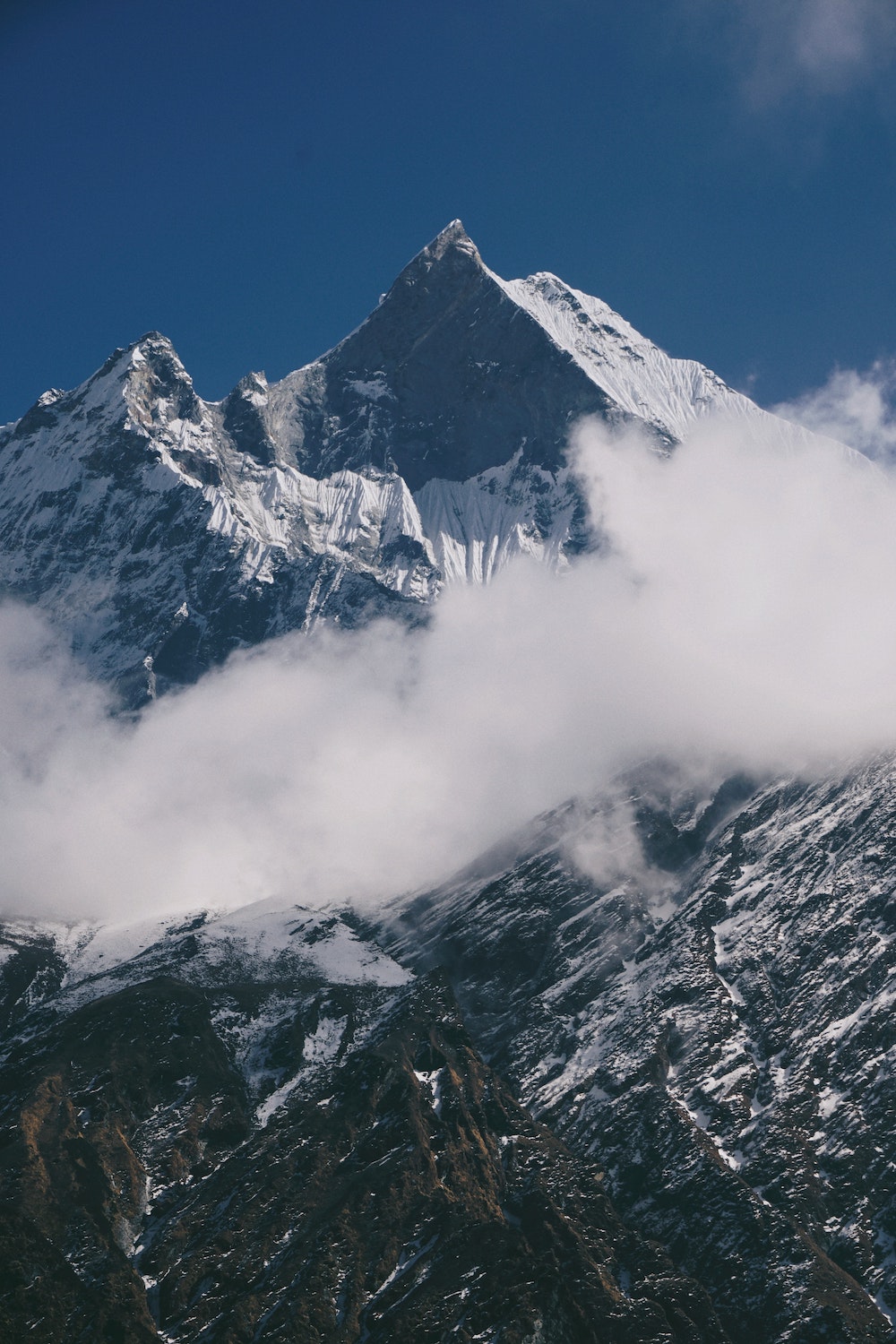Caravanserai
By Steve Watkins
Dave and I had visited the sacred Dalai Lama’s house in the Tibetan refugee village of Dharmsala. We’d bathed in numinous hot springs at the confluence of rivers in the Valley of the Gods. We’d travelled to the thundering Aharbal Falls–literally the end of the bus line in Kashmir–then made our way on foot, a two-day pilgrimage, to the boulder-strewn moonscape on the shores of Konsarnog, a glacial lake hidden high in the Pir Pindal mountains. But whatever spiritual bliss that might have come to us after several weeks in India dissipated as soon as we got to Nepal, where we threw ourselves–or were pulled by forces beyond our reckoning–into full hippie tourist mode.
It was October 1976 and I was a 21-year-old refugee from a series of small Southern towns, followed by three colleges in three years, months of cross-country hitchhiking, summers doing hard labor in a central Florida phosphate mine, and now a drop-out once again. Dave had just finished a two-year Peace Corps stint in dusty Rajasthan Province back in India. We both carried extra baggage that should have slowed us down, but didn’t: me a lingering case of dysentery, him a nasty cold. Every time we settled in somewhere in Kathmandu–a cafe, a temple, a street corner to watch the flocks of Nepalese street kids banging on borrowed or stolen or makeshift rhythm instruments and dancing as if there were no motorcycles and tuk tuks and jeeps blazing past, an elbow away–I had to bolt to the nearest shitter. I couldn’t lose Dave in the marketplace even if I tried. His honking and spitting gave him away every time.
We’d been warned to be careful, that Kathmandu was no longer the Shangri-La it had once been. A suspected serial killer, just arrested in New Delhi, had been accused of robbing and murdering two backpackers in Nepal the year before, and then several more in Thailand. The Nepalese government was worried about the rise in crime, and tired of all the hippies flocking to the country and never leaving–and not spending much money. There had been street sweep round-ups of young travelers with expired visas, and forced deportations to India.
We checked into a nondescript hostel, Traveler’s Lodge, where we met a couple of Canadians, John and Mit, who had just come from Thailand, and who we’d run into again and again—trekking in the Himalayas, back in India months later on a houseboat on the Ganges. They offered us our first taste of Nepalese hash, and directed us to a nearby shop where we rented bicycles with no gears and tenuous brakes, and for the next few hours we flew around the city.
I had expected another New Delhi, but Kathmandu had a village feel to it–all the buildings made of wood and brick and stone, few more than two stories tall. There were temples everywhere we turned, and at the center of the city, in Durbar Square, stood Hanuman Dhoka with its giant, freaky Kali bas relief holding his raised sword and an assortment of severed hands and heads, taking up all of one giant wall. We skipped the bloody livestock sacrifices they did there twice a week.
Nearby was the fabled Freak Street with its row of hippie shops. Every one we entered, somebody handed us a little one-hit pipe, a chillum, stoked with Nepalese hash, or a bhang-filled hookah. Pedaling got harder after every stop. We came across a crumbling temple, dead in the middle of one road, where the giant trunk of an ancient tree grew through the brick and mortar, and branched out over the fallen roof–a striking sight, and a metaphor for something. We sat and stared for a while, letting the river of traffic find its way around us.
We visited the Spirit Catching Bookstore, a hidden shop upstairs on Freak Street that John and Mit recommended, where I picked up a copy of D.T. Suzuki’s Introduction to Zen Buddhism, only finding out later that for as much as Suzuki did to share Zen in the West, he was also an anti-Semite and a Nazi sympathizer. The firangi store keeper played guitar and harmonica, while another guy made his own peanut butter with a mortar and pestle and offered us a taste–and a bag for sale. A German woman came in, colorful head scarf pulled low over her matted hair. She rolled a joint of what she said was Afghan bhang, and asked if they had any Tampax. They didn’t, but we helped her smoke the blunt anyway. Peanut-butter guy rolled his own with something he called Buddha Grass, and we helped him with that, too.
From there it was back on the bikes and down New Road and the main drag, dodging more Suzukis and Hondas and honking Toyotas until Dave stuck out his feet on both sides of his brakeless bicycle and skidded himself to a stop as if suddenly, mysteriously summoned. He was still there when I turned around to find him—his gaze fixed on a nondescript shop, one of dozens lining the street, only out of this particular one wafted the scent, or the scents, of cardamom, cloves, cinnamon, steamed milk, freshly-baked pastries, and of course ubiquitous notes of hash and weed. Strains of Santana’s fusion album Caravanserai escaped the open door, like a siren’s call. And there, propped in one of the shop windows, was a hand-lettered sign:
Pie & Chai.
A young Nepalese boy handed us steaming cups of chai when we walked in, and gestured at an array of cakes and pies lined up on the counter. The small tables splayed around the floor were filled with happy eaters. Somebody fired up a chillum. Everybody fired up a chillum. Everybody who could move, anyway. Most of the firangis there—Westerners, like us–were spaced out, stoned-gazing at the walls, glasses of chai, pastry crumbs, table tops, nothing. We dove into lemon meringue and followed that with a huge slice of pumpkin, and, what the hell, how about a piece of chocolate cake? Stuffed, sated, conquerors of our raging munchies, we too sat in silence after that, us and Santana and our fellow burned-out firangis, stoned-gazing at the walls, our glasses of chai, pastry crumbs, table tops, nothing.
I’d told my parents I would call them when I got to Kathmandu to let them know I was still alive. So when I was finally able to rouse myself from my Pie & Chai stupor, I headed for the Telegraph Office where I spent hours waiting my turn before finally giving up, suddenly missing them like crazy. Dave said I must be homesick, plus wasn’t it my birthday? I went back to the Telegraph Office the next day and used up what little patience I had, again waiting hours for my turn and, finally, shelling out forty rupees for a three-minute conversation that was basically me shouting to Mom and Dad that I was in Nepal and everything was fine and I loved them. They said they loved me, too, but if they added a “Happy Birthday,” ocean storms and rough seas interfered too much for me to hear over the Transatlantic trunk line.
Dave and I returned to Pie & Chai again and again in the days that followed—sometimes just me and him, sometimes with John and Mit—as we made our plans for another long bus ride from Katmandu to Pokhara and trekking in the Himalayas on the Jomsom Trail to the Annapurna base camp, or as close as we could get, unprepared as we turned out to be. Everybody at Pie & Chai was warm company, more than happy to swap stories, travel tips, hand-drawn maps, contacts, addresses back home, dog-eared books, hash they’d gotten tired of smoking in exchange for a new strain that might give them a different kind of buzz. We always left excited about another book we wanted to read, another place we wanted to see, another idea that changed how we looked at the world, if only just a little.
A week later, we were high in the Himalayas, showering under waterfalls, hiking up stone stairs carved into the Annapurna massif, stepping off the trail so pony trains could pass with their oversized loads. We ate dal, baht, and saag at stone and slate houses that passed for travelers’ inns, shivered in our sleeping bags on straw mats, marveled at the thundering echo of distant avalanches that kept us awake through the perfect nights.
And when we returned to Kathmandu, exhausted and as happy as either of us had ever been, we met up with the Canadians one last time at Pie & Chai before the next stage in our journey.
In all the years that followed, I never stopped thinking about Pie & Chai, never stopped wanting to open a place like that myself back in the States—a place where people could gather in warm company to plan for the next mountain they wanted to climb, swap stories, travel tips, hand-drawn maps, listen to Santana, or even better, John Prine, eat a slice of pie, wash it down with a good cup of chai, be a part of something, have a sense of community, maybe even gain a little enlightenment. Only without the hash, because, well, Ringo Starr, my third favorite Beatle, said it better than I ever could: “No, no, no, no, I don’t smoke it no more/I’m tired of waking up on the floor/No thank you please, it only makes me sneeze/And then it makes it hard to find the door.”
What Janet and I finally came up with, after talking about it off and on for the first 20 years of our marriage, and briefly wondering if we could manage a brick and mortar cafe, was this magazine. Our baking and barista skills have never amounted to much, and after I opened and ran two yoga studios, I swore I was done with the business side of things. So here we are, and here, again, is what Janet wrote for our first issue to explain what we’re up to and why:
We’re launching Pie & Chai Magazine for a simple reason: to provide good writers with a place to tell good stories, the kind worth sharing. In these stories—under the broad categories of Deep Dives, Being Human, Prescriptions, LOL, Etcetera, and 22401(ish)—we hope to move, enlighten, and amuse you, and draw you in to a creative community.
We aren’t here to make money. We won’t sell subscriptions, we won’t run ads, we won’t pirate your data, and our contributors won’t get paid. Everything here will exist because someone cared enough to create it. For free.
We’re old-school print journalists, so we believe in facts (not alternative ones) and the power of stories to comfort and afflict. We’ll serve up deep reporting, thoughtful analysis, personal essays and poignant humor. You won’t find press releases here, or fiction. No poetry, either, except as it may offer itself up in some of the prose. What you will find is humanity in all its glorious messiness.
In our dreams, Pie & Chai has been a physical place for dishing up warm desserts and bringing people together. But we don’t own a building, and we’d rather write than cook. So, this is our virtual effort to expand minds, forge connections, and sweeten lives.
Namaste.
***
Steve Watkins, editor and co-founder of Pie & Chai, is the author of 14 books, a retired professor emeritus of American literature, a recovering yoga teacher, and the father of four remarkable daughters. He is also a tree steward with the urban reforestation organization Tree Fredericksburg and founder of Rappahannock Area Beaver Believers, a wildlife advocacy group, which you’re welcome to join on Facebook. His author website is stevewatkinsbooks.com.
Photo credit (Himalayas): Azmi/Unsplash


